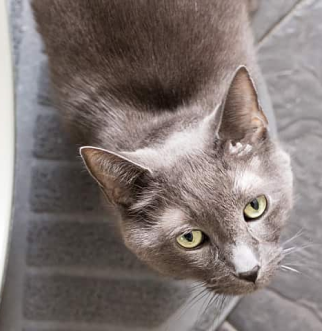

Pancreatitis in cats is an inflammatory condition of the pancreas that now is recognized more frequently, according to the Cornell Feline Health Center. But what does a pancreas do, anyway? What causes it to become inflamed? Even though the condition is relatively rare, learning to spot the signs of feline pancreatitis could be important for your cat's health.
Spotting the Signs of Feline Pancreatitis
The pancreas is a small organ tucked between your cat's stomach and intestines. (Catster offers a helpful diagram of kitty anatomy.) This organ plays a critical role in producing hormones called insulin and glucagon that regulate blood sugar. The pancreas also makes digestive enzymes that help to break down fat, protein, and carbohydrates. This wide range of jobs means that the signs of a pancreatic problem often mimic other medical conditions. Some of those signs include:
- Lethargy
- Dehydration
- Increased thirst and urination (which are easily mistaken for signs of diabetes)
- Poor appetite or refusing to eat
- Weight loss
Vomiting and abdominal pain can also be signs of the condition, but these signs are more common in people and dogs with pancreatitis than in cats. Cats who develop fatty liver disease (hepatic lipidosis) at the same time can also show signs of jaundice like yellow gums and eyes, notes Pet Health Network. Even vague symptoms like lethargy and decreased appetite should warrant a trip to the veterinarian. The earlier the signs are spotted and treatment begins, the better your cat's prognosis may be.
What Causes Pancreatitis?
The exact cause of most feline pancreatitis cases is unknown. The condition has been associated with cats ingesting poisons, contracting parasitic infections, or experiencing trauma like a car accident.
Sometimes cats develop pancreatitis alongside inflammatory bowel disease or cholangiohepatitis (a liver disease), according to Veterinary Partner. Eating too much fatty food is a clear pancreatitis risk for dogs, notes the American Kennel Club, but the link between too much fat and pancreas problems in cats is still being studied.
Diagnosing the Condition
Pancreatitis in cats is divided into two pairs of categories: acute (sudden) or chronic (ongoing), and mild or severe. The World Small Animal Veterinary Association notes that there is a disparity between the number of cats who live with feline pancreatitis and the number who are actually diagnosed and treated. This is mainly because cats with mild cases may show very few signs of the disease. Symptoms that don't seem specific to a disease may not prompt a pet parent to schedule a veterinary visit. Feline pancreatitis is also not easy to definitively diagnose without a biopsy or ultrasound. Many pet parents will forgo these diagnostic tests since they can be expensive.
Fortunately, veterinary scientists are continuing to improve the diagnostic tools available. The serum feline pancreatic lipase immunoreactivity (fPLI) test is a simple non-invasive blood test that looks for markers of pancreatitis. The serum feline trypsin-like immunoreactivity (fTLI) test is not as reliable as the fPLI for diagnosing pancreatitis, but it can help identify exocrine pancreatic insufficiency, a disease that Veterinary Partner notes cats with chronic feline pancreatitis can develop.
Treating Pancreatitis: Emergency Care
Acute feline pancreatitis poses the most serious risk and nearly always requires hospitalization. Chronic pancreatitis, depending on the severity of your cat's case, might require periodic hospital trips but can usually be managed at home. An animal hospital will treat your cat with intravenous (IV) fluids to address their dehydration. IV fluids are also necessary to detoxify the pancreas from damaging inflammatory chemicals. They may also be administered to address dehydration.
While your cat is hospitalized, they might be given antibiotics to minimize their risk of suppurative (infectious) pancreatitis. Hospital veterinarians will also provide your cat with pain relief, as well as anti-nausea medicine to help combat nausea your cat might have. Comforting a cat with pancreatitis is necessary to help them regain their appetite.
Feeding Your Cat While They Recover
Your veterinarian should give you detailed guidance about feeding your cat in recovery. Once they return home from the hospital, most veterinarians recommend feeding your cat as soon as possible if they have an appetite and are not vomiting. If your cat is vomiting frequently and is not at risk for fatty liver disease, your veterinarian might suggest an alternative plan to reintroduce food over a few days. Cats with evidence of fatty liver disease need immediate nutritional support to prevent dangerous liver problems.
It's important to feed your cat a food that is appetizing and easily digestible while they recover. Eventually, your veterinarian might recommend a food that helps with an associated problem like inflammatory bowel disease. For pets who have trouble eating, veterinarians often rely on medications called antiemetics that decrease nausea, control vomiting, and help your cat to regain their appetite.
A cat with pancreatitis who can't eat on their own might require a feeding tube. There are various kinds of feeding tubes. One common type fits into a soft collar that lets your cat move and play normally under supervision. Your veterinarian will discuss the various options and teach you how to administer food, water, and medications through the tube. Although tubes may look intimidating and painful, they are relatively easy to use, gentle on your cat, and extremely important in delivering critical calories and nutrients while they recover.
Although severe cases of feline pancreatitis require hospital stays and specialized care, many forms of feline pancreatitis are mild and non-threatening if appropriately treated. Learning to spot the signs of a problem and acting quickly is the best way to keep your cat healthy. Even cats who develop additional problems like exocrine pancreatic insufficiency or diabetes mellitus are capable of living long and happy lives with the proper care.



















